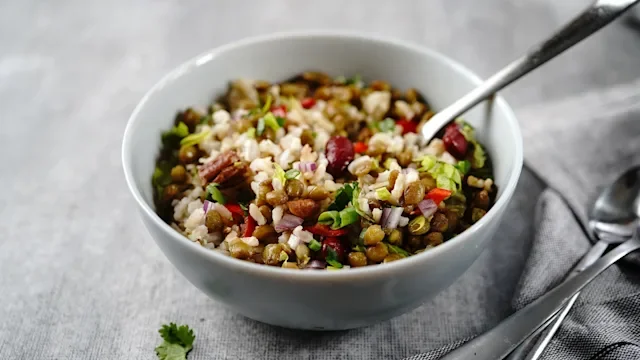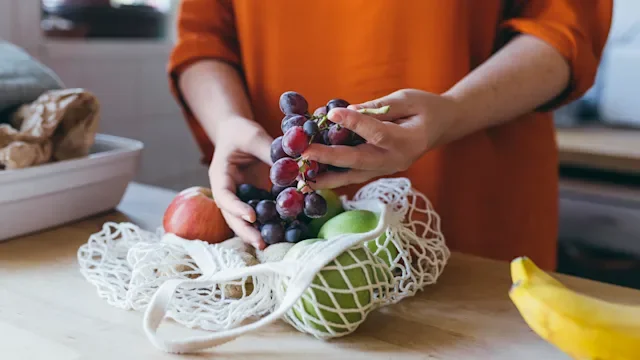Key takeaways:
Certain foods and drinks can interact with the medications you may be taking.
Food-medication interactions may lower the effectiveness of medications or, in some cases, cause mild to serious side effects.
Ask your pharmacist or healthcare provider if any of your medications may interact with certain parts of your diet.
Save on related medications
Medications work and interact with your body in many ways. Several possible factors — including the foods and drinks you consume — can influence how your body responds to medications.
Many different parts of your diet can change your body’s ability to break down medications or allow medications to work properly. While some interactions are mild, others can be serious and lead to a variety of possible complications. No matter the severity, it’s important to be aware of common food-medication interactions.
In this article, we’ll review some interactions between foods, drinks, and medications and why they occur.

5 foods and drinks that can interact with your medications
Like mentioned, it’s important to be aware of possible interactions between your diet and the medications that you take. Below are five common foods and drinks that may cause an interaction.
Please note this is not an all-inclusive list of possible interactions. When possible, have a conversation with your healthcare provider or pharmacist about all of the medications and supplements you take to see if any of them may interact with parts of your diet.
Caffeine
Several medications may interact with coffee or other products that contain caffeine, such as tea, soda, some migraine medications, and certain dietary supplements. Caffeine can temporarily raise a person’s heart rate and blood pressure. Coffee can also change the acidity of a person’s stomach, which can alter the way medications are absorbed or broken down.
Groups of medications that may be affected when drinking coffee or other caffeinated beverages include:
ADHD medications such as Adderall (mixed amphetamine salts) and other stimulants
Anesthetics such as ropivacaine (Naropin)
Anticoagulants such as warfarin (Coumadin, Jantoven)
Antipsychotics such as clozapine (Clozaril), haloperidol (Haldol), olanzapine (Zyprexa)
Heart medications such as propafenone (Rythmol), propranolol (Inderal), and verapamil (Calan)
Immunosuppressants such as methotrexate
Tricyclic antidepressants (TCAs) such as amitriptyline (Elavil) and clomipramine (Anafranil)
If you regularly drink coffee or caffeine and are taking medications like the ones mentioned above, it’s recommended to talk to your healthcare provider about possible interactions.
Bananas
Bananas are rich in potassium, which plays an important role in the function of heart cells and maintaining a regular heartbeat. Potassium also helps support the function of nerves and maintenance of overall muscle health.
Some medications — like ARBs (angiotensin II receptor blockers) and ACE (angiotensin-converting enzyme) inhibitors used to lower blood pressure — may raise potassium levels in your body. Over-the-counter (OTC) pain medications like ibuprofen (Advil, Motrin) and naproxen (Aleve, Naprosyn) can also raise potassium levels.
Read more like this
Explore these related articles, suggested for readers like you.
Very high potassium levels in your body may cause irregular heartbeat or loss of heart function — known as cardiac arrest. There is no strong evidence that bananas should be avoided altogether when taking certain medications, but it’s important to be aware of these possible effects when they are eaten in large quantities. Your healthcare provider may be able to tell you how many bananas to limit yourself to every day.
Fruit juices
Fruit juices have many substances and properties that can interact with medications and their ability to be broken down by your liver. The main interactions are with enzymes (proteins) in your body called cytochromes (CYPs) that are used to break down (metabolize) many medications.
Orange juice can lower how well your body absorbs alendronate (Fosamax) — a medication used for osteoporosis. It’s recommended to take alendronate on an empty stomach, and — if it cannot be avoided — wait at least 2 hours until consuming orange juice.
Apple juice can lower the effects of aliskiren (Tekturna) — a medication used to treat high blood pressure — and it’s recommended to avoid taking them together. If high blood pressure goes untreated or a medication is not working as intended, a person could experience serious effects such as stroke, heart disease, and heart failure.
Apple juice and orange juice may potentially lower the effects of medications like atenolol (Tenormin), fexofenadine (Allegra), and montelukast (Singulair). This interaction is typically mild — your pharmacist or healthcare provider may be able to tell you if these need to be separated.
A common, well-known interaction is with grapefruit juice and statin medications — like atorvastatin (Lipitor), simvastatin (Zocor), and lovastatin (Mevacor) — which are used to lower cholesterol. Grapefruit juice’s interactions are discussed more in detail in a previous GoodRx article.
Cheese
Cheese can cause a very serious reaction if eaten while taking a monoamine oxidase inhibitor (MAOI), like isocarboxazid (Marplan), phenelzine (Nardil), or selegiline (Emsam). MAOIs are used to treat depression and Parkinson’s disease.
These medications may cause the buildup of tyramine — a chemical that can raise blood pressure. As cheese ages, it becomes high in tyramine, which further raises blood pressure. The reaction — often referred to as the “cheese reaction” — may cause severe headaches and dangerously high blood pressure.
In addition to cheese, other dairy products such as milk and butter can also interact with medications. These are further discussed below.
Licorice
Licorice is commonly consumed as a candy or sweetener. It’s found in various foods and drinks, but it has also been used as an herbal medication.
Licorice — particularly black licorice — can enhance the effects of certain medications and lower the effects of others. This occurs because licorice interacts with many of the substances in the body that are used to break down medications. Medications that licorice may interact with include warfarin, cyclosporine (Sandimmune), and cortisone.
But, in the U.S., many licorice products don’t actually contain real licorice root or licorice extract — they use similar tasting substitutes like anise oil. So, if your favorite licorice candy contains a substitute instead of licorice extract or licorice root, you should be in the clear.
Types of foods that can cause issues with medications
In addition to specific foods, certain groups of food have substances that can cause issues with your medications. Some of these interactions may cause you to change your diet or make sure that it stays consistent.
Leafy, green vegetables
Foods like leafy green vegetables can affect warfarin, which belongs to a group of medications called anticoagulants — or blood thinners. Warfarin blocks the production of vitamin K, which is needed for certain processes that cause blood clots. Leafy green vegetables, such as kale, spinach, and Brussels sprouts, contain high amounts of vitamin K and may lower the effects of warfarin.
The goal of warfarin therapy is to maintain a person’s INR (international normalized ratio) — a type of measurement that tells how well your blood can form a clot — within a target range. Significant changes in your intake of leafy green vegetables while taking warfarin can cause changes in your INR. This can raise your risk of bleeding or serious blood clots.
But studies show that you don’t need to stop or cut down on your typical consumption of these foods when you start taking warfarin. Instead of avoiding leafy green vegetables, it’s recommended to maintain a stable diet of these foods. In other words, it’s important to keep the amount of foods in your diet that contain a high amount of vitamin K consistent.
Dairy products
Dairy products — such as milk, butter, and cheese — can affect how well your body absorbs certain antibiotics. These can lessen the effects of the medications, making them less effective at fighting infections.
Specifically, tetracyclines are a group of antibiotics that include medications like doxycycline (Vibramycin) and minocycline (Minocin). Tetracyclines should especially be avoided with dairy products. It’s recommended to wait up to 3 hours after taking antibiotics before eating or drinking dairy.
Alcohol
Mixing alcohol with certain medications, like metronidazole (Flagyl), phenytoin (Dilantin), and metformin (Glucophage), can be dangerous and, in some cases, life-threatening. Side effects may include nausea, headaches, and vomiting, as well as an increased risk of internal bleeding and heart problems.
Without eliminating these foods from your diet, is there any way to minimize the likelihood of a negative food-medication interaction?
The risk of some food-medication interactions may be lowered by allowing time to pass between consuming a food or drink and taking a medication. But, other foods should be avoided altogether. It’s recommended to talk to your healthcare provider about the possibility of eating certain foods while taking medications and the appropriate timing.
Should you tell your doctor if you’re on a special diet?
Certain diets can also affect how well your medications are absorbed and work in your system, which, in some cases, might be dangerous.
People may turn to the ketogenic diet — which focuses on low-carbohydrate and moderate protein restriction — as an option to help them lose weight. There are general risks associated with the ketogenic diet, such as nausea and vomiting, kidney stones, and vitamin deficiency. But for a person that receives medications to treat diabetes, this diet can cause hypoglycemia — or low blood sugar — if not managed properly.
Intermittent fasting — or only eating between certain hours of the day — can affect certain medications. For example, ziprasidone (Geodon) is an antipsychotic medication that relies on food, and its absorption can double when taken with food. As a result, taking ziprasidone on an empty stomach — or while fasting — can lower its absorption by your body and lead to lessened effects.
It’s recommended to talk to your healthcare provider before starting a special diet if you are taking medications.
Can food allergies affect what type of medication you can take?
Food allergies can give you insight into certain medications you should take or avoid.
For example, egg protein is used in many vaccines and may impact a healthcare provider’s choice of vaccines if a person is allergic to eggs. Also, many capsules used to hold medications are made of gelatin — which often comes from pig sources — and can cause allergic reactions if taken by a person who is allergic to pork. Progesterone (Prometrium) capsules contain peanut oil and should never be used by someone with a peanut allergy.
It’s recommended to make sure that your healthcare providers and pharmacists all know about your allergies — as a team they can help make sure you aren’t given a medication that will cause an allergic reaction.
The bottom line
Many foods, drinks, and diets may change the effects of medications. It’s important to be aware of common food-medication interactions and understand why they occur. This may help you avoid harmful reactions and, in some cases, improve the effects of some medications. It’s recommended to talk to your healthcare provider about foods and drinks that may interact with the medications you’re taking.

Why trust our experts?



References
American Heart Association. (2015). These foods are low in vitamin K.
American Heart Association. (2021). About cardiac arrest.
Anderson, M. C., et al. (1993). Monoamine oxidase inhibitors and the cheese effect. Neurochemical Research.
A-S Medication Solutions. (2021). Warfarin sodium [package insert].
Batch, J. T., et al. (2020). Advantages and disadvantages of the ketogenic diet: A review article. Cureus.
Belayneh, A., et al. (2020). The effect of coffee on pharmacokinetic properties of drugs : A review. BioMed Research International.
Bibi, Z. (2008). Role of cytochrome P450 in drug interactions. Nutrition & Metabolism.
Bushra, R., et al. (2011). Food-drug interactions. Oman Medical Journal.
Choi, J. H., et al. (2017). Food and drug interactions. Journal of Lifestyle Medicine.
Citrome, L. (2009). Using oral ziprasidone effectively: The food effect and dose-response. Advances in Therapy.
Fiedorowicz, J. G., et al. (2004). The role of monoamine oxidase inhibitors in current psychiatric practice. Journal of Psychiatric Practice.
Institute for Quality and Efficiency in Health Care. (2013). Using medication: Using antibiotics correctly and avoiding resistance. InformedHealth.org.
Kelso, J. M., et al. (2012). Adverse reactions to vaccines practice parameter 2012 update. The Journal of Allergy and Clinical Immunology.
Kuruvilla, M., et al. (2001). A review of warfarin dosing and monitoring. Baylor University Medical Center Proceedings.
Land, M. H., et al. (2012). Near fatal anaphylaxis from orally administered gelatin capsule. The Journal of Allergy and Clinical Immunology: In Practice.
Landham-New, S. A., et al. (2012). Potassium. Advances in Nutrition.
Macleods Pharmaceuticals Limited. (2021). Ziprasidone hydrochloride [package insert].
McCabe, B. J. (1986). Dietary tyramine and other pressor amines in MAOI regimens: A review. Journal of the American Diatetic Association.
MedlinePlus. (2021). Prothrombin time test and INR (PT/INR).
National Center for Complementary and Integrative Health. (2020). Licorice root.
National Institute on Alcohol Abuse and Alcoholism. (2014). Harmful interactions.
Office of Dietary Supplements. (2021). Potassium.
Omar, H. R., et al. (2012). Licorice abuse: Time to send a warning message. Therapeutic Advances in Endocrinology and Metabolism.
Petric, Z., et al. (2021). Food–drug interactions with fruit juices. Foods.
Qiao, X., et al. (2014). Identification of key licorice constituents which interact with cytochrome P450: Evaluation by LC/MS/MS cocktail assay and metabolic profiling. The APPS Journal.
Rao, T. S. S., et al. (2009). Hypertensive crisis and cheese. Indian Journal of Psychiatry.
Singh, S., et al. (2017). Prevalence and associated risk factors of hypertension: A cross-sectional study in urban varanasi. International Journal of Hypertension.
Stockman, M. C., et al. (2018). Intermittent fasting: Is the wait worth the weight? Current Obesity Reports.
Temple, J. L., et al. (2017). The safety of ingested caffeine: A comprehensive review. Frontiers in Psychiatry.
Tideman, P. A., et al. (2015). How to manage warfarin therapy. Australian Prescriber.
U.S. Food and Drug Administration. (2017). Black licorice: Trick or treat?
Violi, F., et al. (2016). Interaction between dietary vitamin K intake and anticoagulation by vitamin K antagonists: Is it really true?: A systematic review. Medicine.
Virtus Pharmaceuticals. (2021). Prometrium [package insert].
Weathermon, R., et al. (1999). Alcohol and medication interactions. Alcohol Research & Health.


















